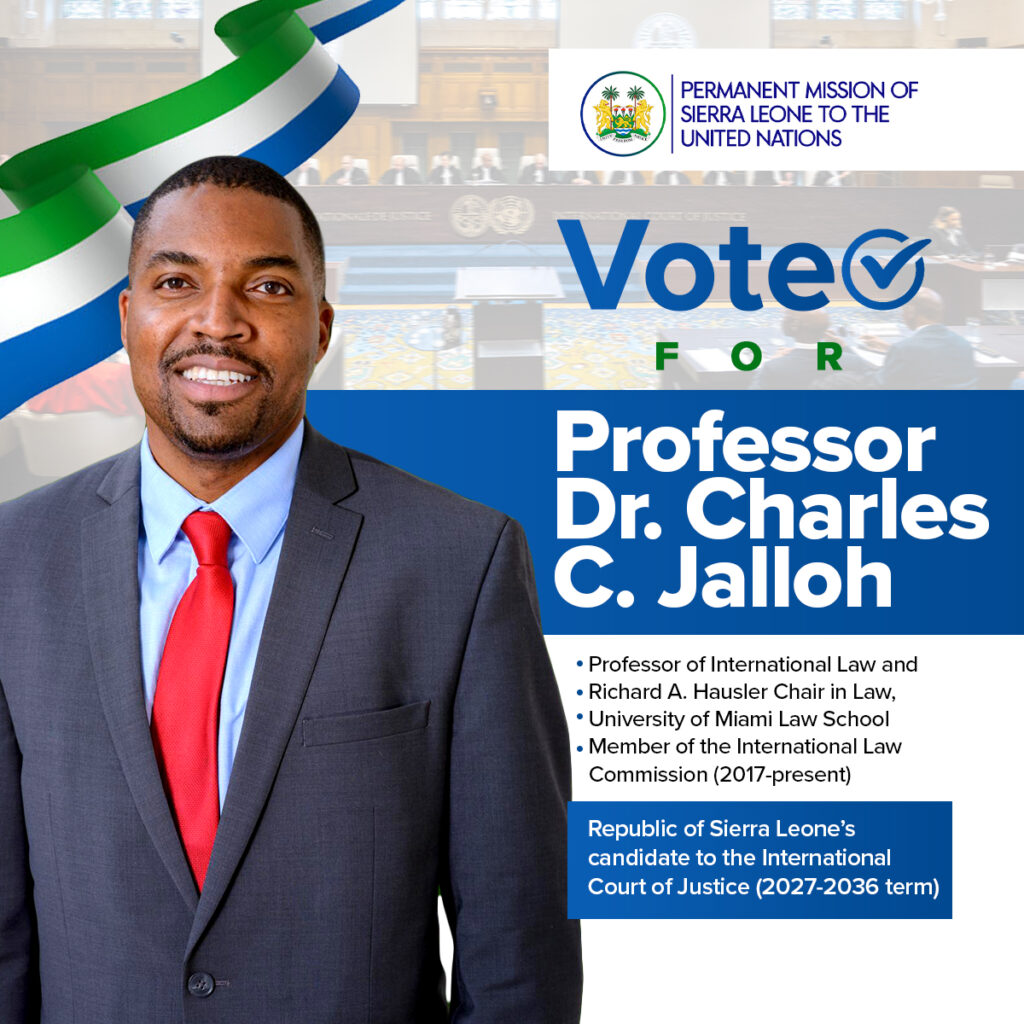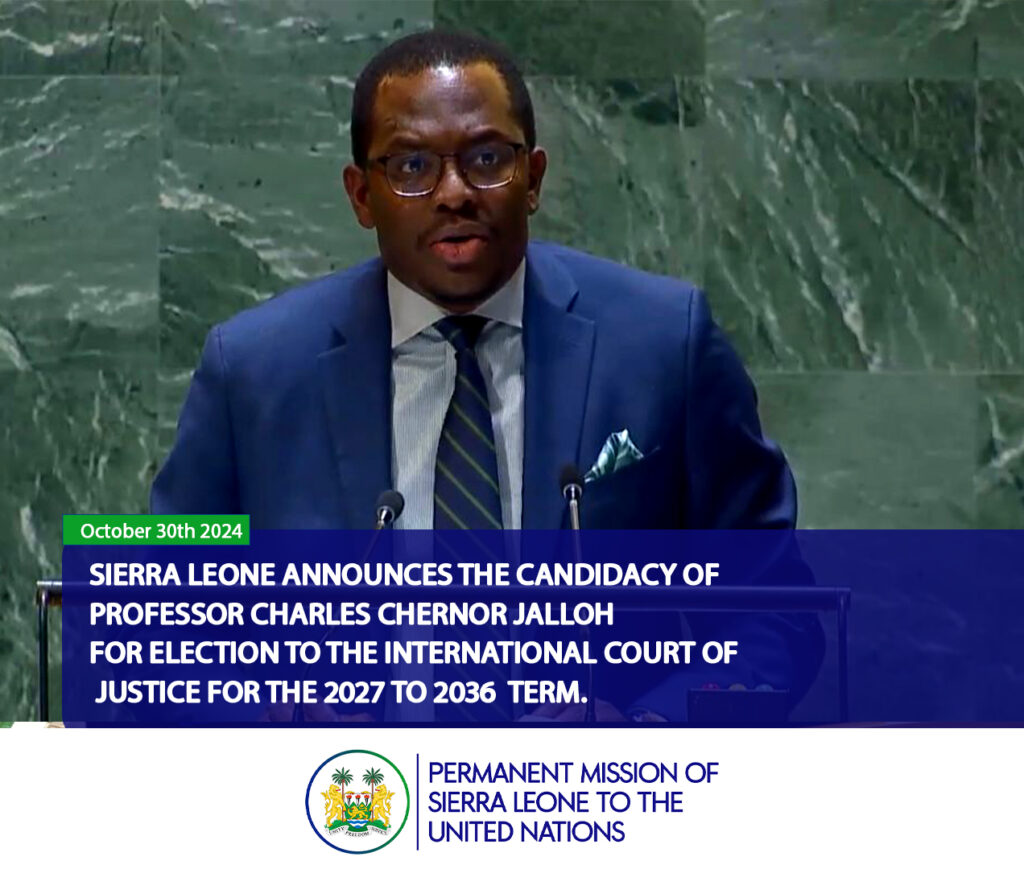STATEMENT BY
H. E. DR. MICHAEL IMRAN KANU
AMBASSADOR PERMANENT REPRESENTATIVE
AT THE UNITED NATIONS GENERAL ASSEMBLY PLENARY MEETING ON AGENDA ITEM 73: “REPORT OF THE INTERNATIONAL COURT OF JUSTICE”
Mr. President,
The delegation of Sierra Leone aligns this statement with those delivered on behalf of the Non-Aligned Movement and the Core Group of States requesting an Advisory Opinion on Obligations of States in respect of Climate Change from theInternational Court of Justice (“ICJ”).
I thank Judge Nawaf Salam, President of the ICJ, for this comprehensive introduction of the “Report of the International Court of Justice” on the Court’s activities from 1 August 2023 to 31 July 2024, as contained in document A/79/4.
We thank the United Nations Secretary-General for the information contained in his report A/79/314 on the trust fund to assist States in the settlement of disputes through the ICJ.
At the outset, let me reiterate that Sierra Leone remains unwavering in its commitment to the peaceful settlement of disputes as enshrined in the UN Charter and engrained in international law. We accordingly affirmed our firm commitment and belief in the role and value of the ICJ in peacefully resolving disputes between States and assisting to prevent or resolve conflicts.
The report A/79/4 confirms that the ICJ has had a busy juridical year, as the Court, in the period under review, delivered 2 judgments and 1 advisory opinion, in addition to itself or its President rendering 27 orders, and holding public hearings in 11 cases. We welcome the fact that during the period under review, the Court became seized of 4 new contentious cases and 1 request for an advisory opinion.
While the advisory opinions do have implications for member States in all regions, the Court contentious cases docket involves States parties before the Court as at 31 July 2024 included “four States from the Group of Asia-Pacific States, eight from the Group of Latin American and Caribbean States, four from the Group of African States, six from the Group of Eastern European States, and nine from the Group of Western European and other States” as at 31 July 2024.
We agree with the view expressed in the report that the “geographical spread of the cases brought before the Court and the diversity of their subject matter illustrate the universal and general character of the Court’s jurisdiction”. With the overall participation of States in the period under review totally 134, the high level of activities and the wide range of issues not only demonstrate the value, effectiveness and efficiency of the Court, but significantly the continuing confidence of States on its mandate and legitimacy.
Mr. President,
On the contentious cases before the Court, and as an elected member of the UN Security Council, Sierra Leone welcomes the significant recourse to the ICJ even in situations of ongoing violent and brutal conflicts, including in the Application of the Convention on the Prevention and Punishment of the Crime of Genocide in the Gaza Strip (South Africa v. Israel); and Alleged Breaches of Certain International Obligations in respect of the Occupied Palestinian Territory (Nicaragua v. Germany). As these matters are sub judice, we would not offer views on the merit at this moment. However, we must insist that the orders on provisional measures have binding effect and thus create international legal obligations for any party to whom the provisional measures have been addressed.
On the important role of the Court’s advisory opinions and on advisory opinion themselves, Sierra Leone welcomes the ICJ’s advisory opinion on the Legal Consequences arising from the Policies and Practices of Israel in the Occupied Palestinian Territory, including East Jerusalem delivered on 19 July 2024, including its legal and moral clarity.
We note significantly that further to the conclusion that “the State of Israel’s continued presence in the Occupied Palestinian Territory is unlawful”, the ICJ further outlined the obligations of all States with respect to its opinion to the effect that “all States are under an obligation not to recognize as legal the situation arising from the unlawful presence of the State of Israel in the Occupied Palestinian Territory and not to render aid or assistance in maintaining the situation created by the continued presence of the State of Israel in the Occupied Palestinian Territory”.
At this stage of intense violence in the Occupied Palestine Territory, in particular the Gaza Strip, acting on the advisory opinion of the Court would serve as a significant step towards the realization of achieving the political horizon of the ‘two-state’ solution based on the UN General Assembly and Security Council resolutions adopted on the ‘Question of Palestine,’ beginning with resolution 181 (ii), which recommends an independent Jewish State and an independent Arab State in line with Article 4 (1) of the United Nations Charter. The ICJ in our view must be commended for proving the necessary legal and moral clarity, that begs for political action by the United Nations and member States.
Sierra Leone continues to underscore the importance of the request by the General Assembly for an advisory opinion on Obligations of States in respect of Climate Change (A/RES/77/276, adopted on 29 March 2023), and commends the Court on the progress of the proceedings, including the scheduling of the public hearings to open on 2 December 2024. As a member of the Core Group of States, Sierra Leone looks forward to participating in the public hearings.
Mr. President,
The ICJ is the pre-eminent adjudicative body for the peaceful settlement of disputes at the international level. As a court of justice and the principal judicial organ of the United Nations, it occupies a unique position as “The World Court.” It is the only international court with universal reach and general jurisdiction, and therefore, it must be appropriately resourced to undertake its important work. In noting the current budgetary constraints faced by the Court, we must emphasize that the sound administration of justice and the demanding docket must inform how the Court is resourced.
Sierra Leone notes that the Court is experiencing one of the most dynamic periods in its almost 80-year history. In reiterating our strong support for the Court, we wholeheartedly welcome its dynamism in the fulfilment of its mandate, which eventually strengthens the multilateral international legal system.
As part of demonstrating our commitment and support, the Government of Sierra Leone, upon the nomination of the National Group, is pleased to announce the candidacy of Professor Charles Chernor Jalloh for election to the ICJ for the 2027 to 2036 term, with elections to be held in November 2026.
As a member of the International Law Commission (“ILC”) since 2017, and currently the Special Rapporteur for the topic “Subsidiary means for the determination of rules of international law” and the Chair of the Working Group on Methods of Work and Procedures, in addition to the many other leadership positions, Professor Jalloh’s competence in international law is well recognized, and he is of high moral character. Based on his experience, expertise and qualifications, Professor Jalloh would contribute scientific rigor and sound practical experience to the Court’s work. We look forward to engaging all member States in the months ahead as we seek your support for this important endeavour.
In closing, Mr. President, let me reiterate Sierra Leone’s appreciation of the Court’s Trust Fund’s commitment to improving young people’s understanding of international law and the Court’s procedures through its annual Judicial Fellowship Programme, including increasing opportunities for fellows nominated from universities based in developing countries.
I thank you.




